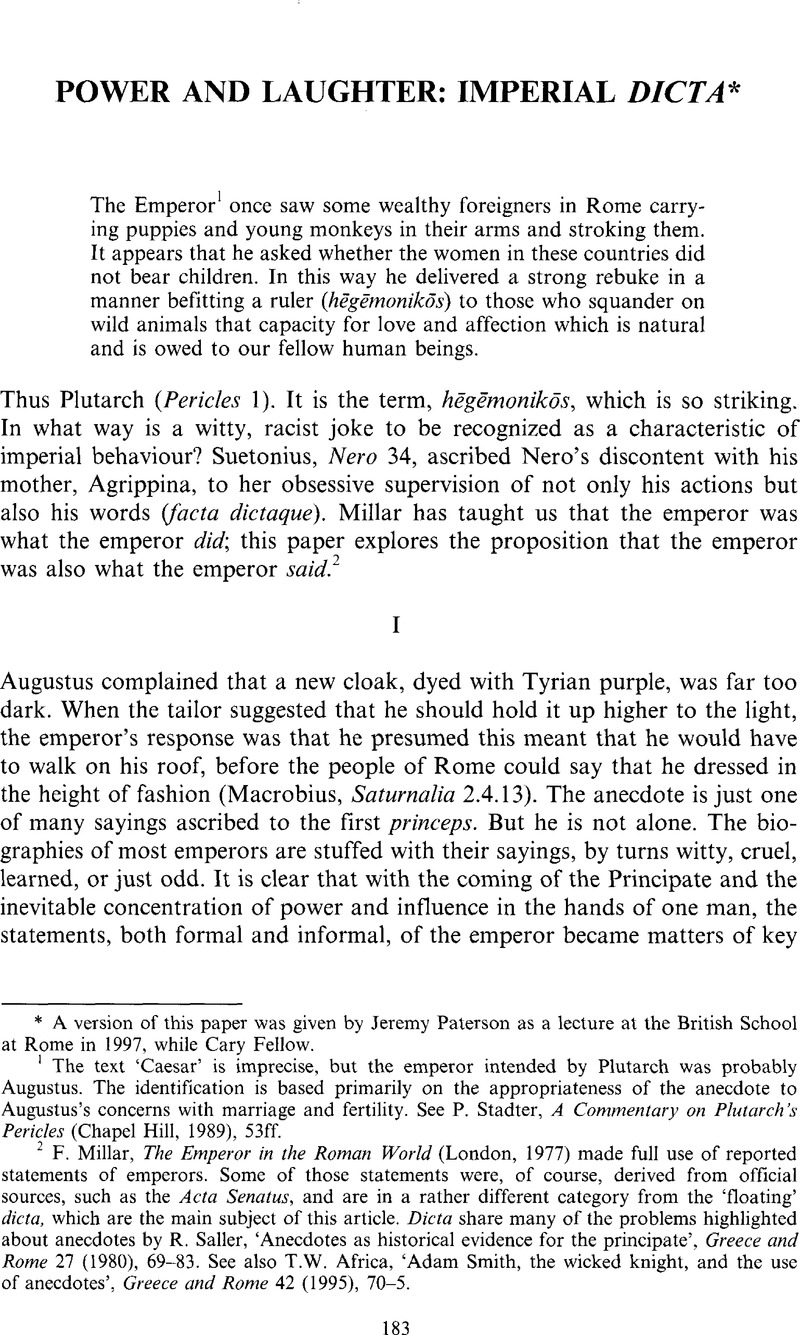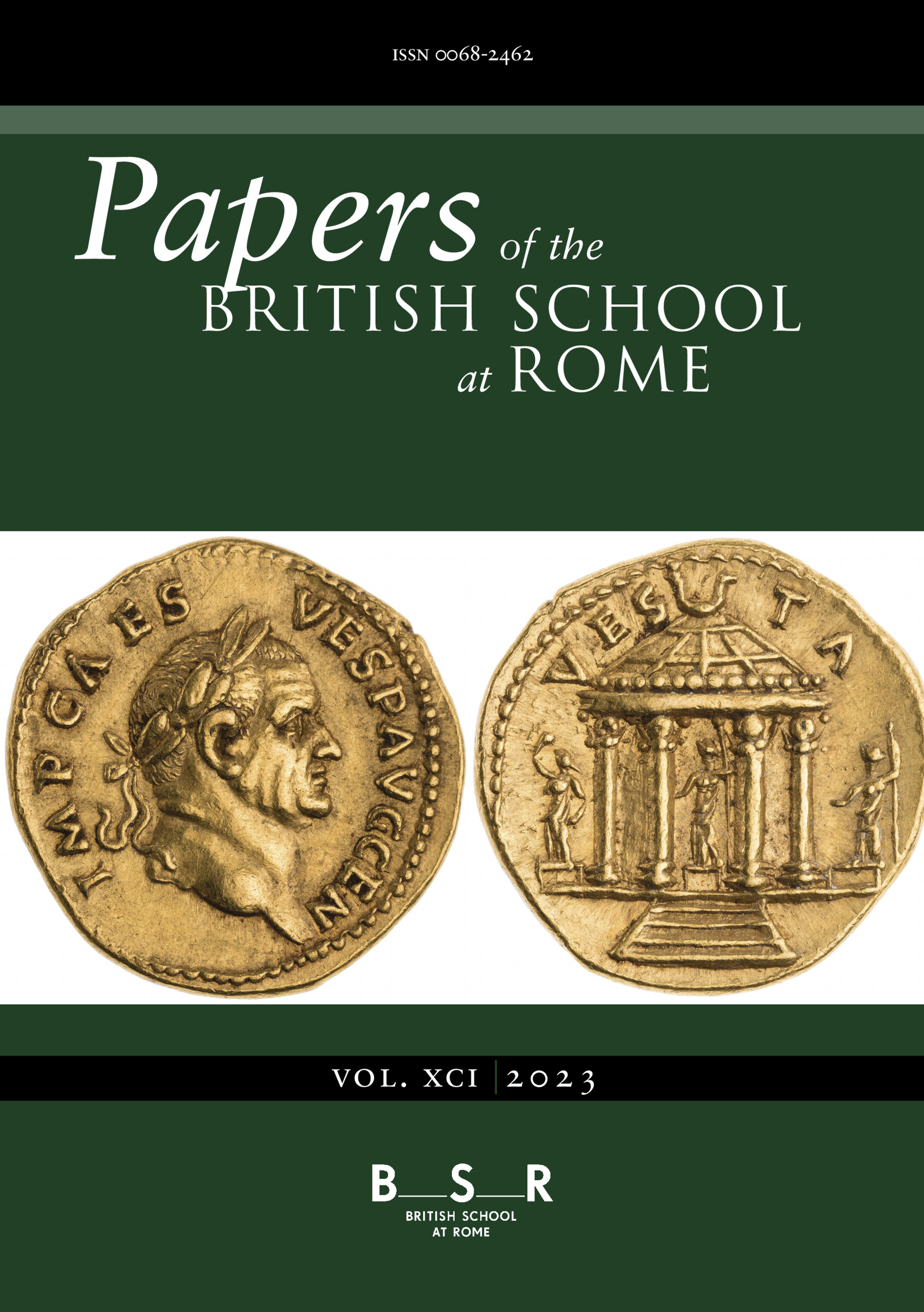Article contents
Power and laughter: imperial dicta*
Published online by Cambridge University Press: 09 August 2013
Abstract

- Type
- Articles
- Information
- Copyright
- Copyright © British School at Rome 1999
Footnotes
A version of this paper was given by Jeremy Paterson as a lecture at the British School at Rome in 1997, while Cary Fellow.
References
1 The text ‘Caesar’ is imprecise, but the emperor intended by Plutarch was probably Augustus. The identification is based primarily on the appropriateness of the anecdote to Augustus's concerns with marriage and fertility. See Stadter, P., A Commentary on Plutarch's Pericles (Chapel Hill, 1989), 53ffGoogle Scholar.
2 Millar, F., The Emperor in the Roman World (London, 1977Google Scholar) made full use of reported statements of emperors. Some of those statements were, of course, derived from official sources, such as the Acta Senatus, and are in a rather different category from the ‘floating’ dicta, which are the main subject of this article. Dicta share many of the problems highlighted about anecdotes by Sailer, R., ‘Anecdotes as historical evidence for the principate’, Greece and Rome 27 (1980), 69–83CrossRefGoogle Scholar. See also Africa, T.W., ‘Adam Smith, the wicked knight, and the use of anecdotes’, Greece and Rome 42 (1995), 70–5CrossRefGoogle Scholar.
3 For Porcellus, see Seneca, , Suasoriae 2.13Google Scholar and Suetonius, , De Grammaticis 22.1Google Scholar. The emendation of Dio's text to Marcellus and the identification with M. Claudius Marcellus Aeserninus has nothing to commend it (see now Kaster, R.A., Suetonius de Grammaticis et Rhetoribus (Oxford, 1995), 222Google Scholar).
4 For Augustus's coining of the term ‘munerarius’ see Quintilian, , Institutio oratoria 8.3.34Google Scholar. Compare Suetonius's particular interest in the vocabulary and linguistic jokes of emperors (Augustus 86–8, Nero 33, Vespasian 23).
5 Yavetz, Z., ‘The personality of Augustus: reflections on Syme's Roman Revolution’, in Raabflaub, K.A. and Toher, M. (eds), Between Republic and Empire (California, 1990), 21ffGoogle Scholar.
6 Cited by Macrobius, , Saturnalia 2.1.44Google Scholar.
7 So, for example, Suetonius, Nero 39 and Galba 13.
8 Plutarch, Comparison of Demosthenes and Cicero 1 and Cicero 27.
9 Corbett, P., The Scurra (Scottish Classical Studies 2) (Edinburgh, 1986)Google Scholar.
10 On the distinction between the abusive tone of dicax and the art associated with being witty, facetus, see Cicero, Orator 90.
11 Morel, J.P., ‘La iuventus et les origines du theatre Romain’, Revues des Études Latines 47 (1970), 208ffGoogle Scholar.
12 Garton, C., Personal Aspects of the Roman Theatre (Toronto, 1972), 141–68Google Scholar.
13 Seneca, , Controversiae 7.2.14Google Scholar, 7.3.8, 7.4.8.
14 Suetonius, Augustus 89.
15 A revealing example of how dicta could be invested with different meanings is shown by Dio, 56.30.3, who gave the words a philosophical significance: ‘In this way he ridiculed most tellingly the whole life of man’.
16 Nero, most notoriously, but also, for example, Claudius (Tacitus, , Annales 12.49.1Google Scholar), Commodus, (Scriptores Historiae Augustae, Commodus 1.7–8Google Scholar) and Gallienus, (Scriptores Historiae Augustae, Gallienus 17.7Google Scholar).
17 On this see the wise comments of Horsfall, N., La cultura della plebs romana (Barcelona, 1996Google Scholar).
18 Recently well analysed by Toner, J.P., Leisure and Ancient Rome (Cambridge, 1995Google Scholar) and Edwards, C.H., The Politics of Immorality in Ancient Rome (Cambridge, 1993CrossRefGoogle Scholar).
19 Cicero, , De Officiis 1.104Google Scholar, with an example in De Oratore 2.271.
20 Rossi, O., ‘De M. Catonis dictis et Apophthegmatis’, Athenaeum n.s. 2 (1924), 174ffGoogle Scholar. and Astin, A., Cato the Censor (Oxford, 1978), 186ff.Google Scholar, although Astin does not show awareness of the tradition in which Cato was working.
21 See the learned article by Barns, J., ‘A new gnomologium: with some remarks on gnomic anthologies’, Classical Quarterly 44 (1950), 126–37CrossRefGoogle Scholar and n.s. 1, 1–19. Now also Cameron, A., The Greek Anthology (Oxford, 1993), 1ffGoogle Scholar. See Quintilian, , Institutio oratoria 1.9Google Scholar and Seneca, Epistulae 33, who advised against overreliance on maxims.
22 Not the work of Plutarch (see K. Ziegler, in Pauly-Wissowa, Real-Encyclopädie der Klassischen Altertumswissenschaft, s.v. ‘Plutarchos’, 863.16ff.). Although there is a clear relationship with Plutarch's Lives, it is not simply a collection culled from those works.
23 Cf. Vitruvius, De Architectura preface and Horace, , Epistulae 2.1.4Google Scholar (‘si longo sermone morer tua tempora, Caesar’).
24 On ancient concepts of personality see C. Gill, ‘The character-personality distinction’ and Halliwell, S., ‘Traditional Greek conceptions of character’ in Pelling, C. (ed.), Characterization and Individuality in Greek Literature (Oxford, 1990), 1ff. and 32ffGoogle Scholar.
25 Stacker, P.A., A Commentary on Plutarch's Pericles (Chapel Hill, 1989), 53ffGoogle Scholar.
26 On the trend see Keynes, S. and Lapidge, M., Alfred the Great. Asser's ‘Life of King Alfred’ and other Contemporary Sources (Harmondsworth, 1983), 46ffGoogle Scholar. For the collection in the later Middle Ages, known as the Proverbs of Alfred, see the editions by Arngart, O. (Lund, 1942–1955Google Scholar) and H.P. South (1931).
27 Wesselski, A., Angelo Polizianos Tagebuch (1477–1499) (Jena, 1929Google Scholar), ascribed it to Poliziano.
28 Bowen, B.C., ‘Roman jokes and the Renaissance prince, 1455–1528’, Illinois Classical Studies 9 (2) (1984), 137–48Google Scholar.
29 G. Townend, ‘The sources of the Greek in Suetonius’, Hermes (1960), 98ff.
30 Laurence, R., ‘History and female power’, in Cornell, T. and Lomas, K. (eds), Gender and Ethnicity in Ancient Italy (Accordia Specialist Studies on Italy 6) (London, 1997), 136–7Google Scholar.
31 On wives see, for example, Suetonius, Claudius 43, Domitian 10, Dio 69.10; on daughters, for example, Suetonius, Augustus 65, Dio 55.10.16, Macrobius, , Saturnalia 2.4.11Google Scholar; on heirs, for example, Suetonius, Claudius 43.
32 Suetonius, Gaius Caligula 12, Tacitus, , Annales 6.46Google Scholar and Dio 58.28. Note the dictum on ‘worshipping the rising rather than the setting sun’ was also put in the mouth of Pompey about Sulla (Plutarch, Pompey 14).
33 On the verbal posturing involved in such incidents see now Cooley, A.C., ‘The moralising message of the Senatus Consultum de Cn. Pisone Patre’, Greece and Rome 45 (1998), 199CrossRefGoogle Scholar.
34 For similar word play see Macrobius, , Saturnalia 2.4.10Google Scholar. For other examples of dicta as rebukes see, for example, Suetonius, Vespasian 8, Scriptores Historiae Augustae, Hadrian 21, Plutarch, Moralia 207E.
- 2
- Cited by


